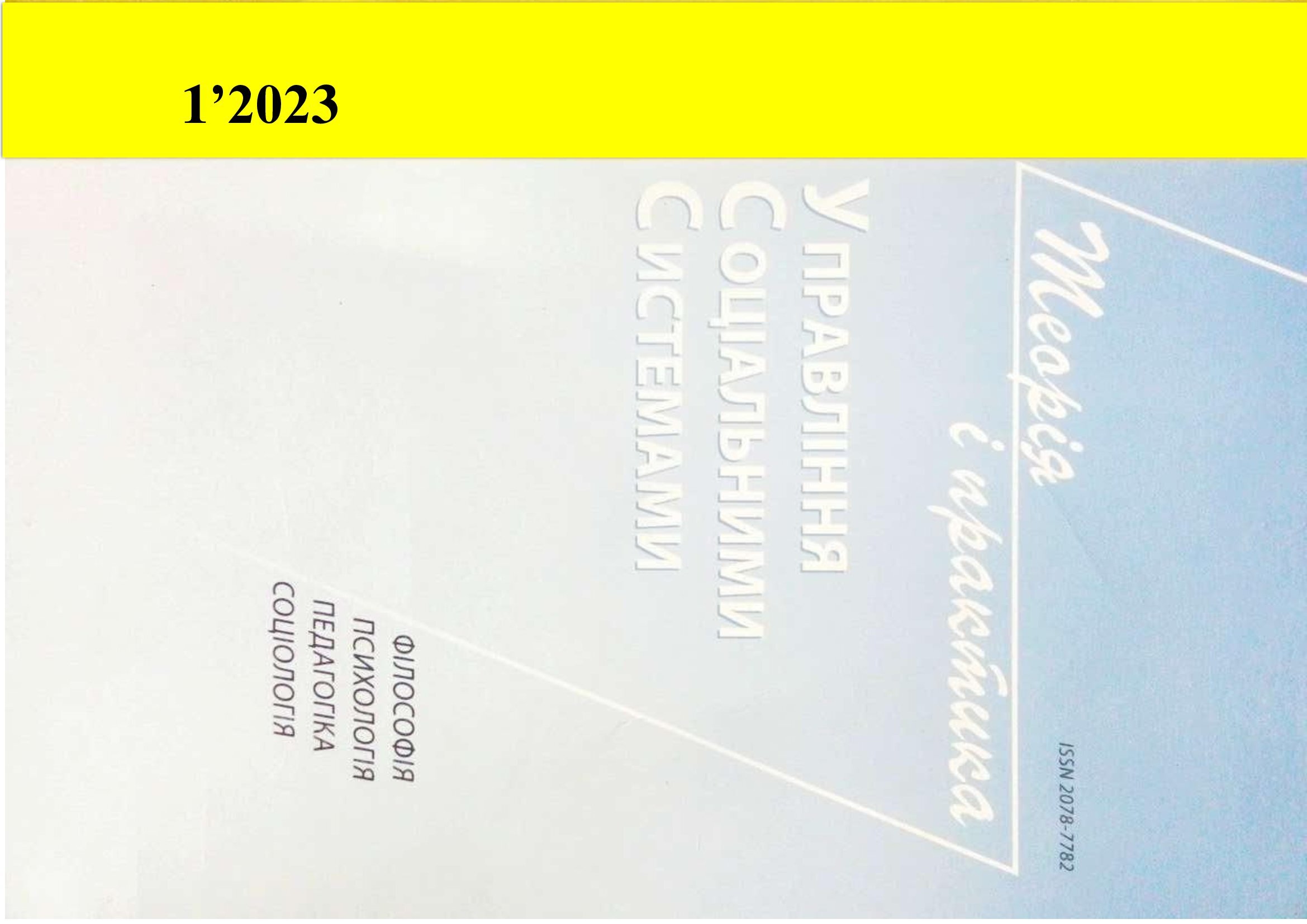СВІТОВИЙ ДОСВІД ВПРОВАДЖЕННЯ ТЕОРІЙ ЛІДЕРСТВА У СТРАТЕГІЮ ПІДГОТОВКИ МАЙБУТНІХ ФАХІВЦІВ ДЕРЖАВНОЇ СЛУЖБИ З НАДЗВИЧАЙНИХ СИТУАЦІЙ
DOI:
https://doi.org/10.20998/2078-7782.2023.1.08Ключові слова:
теорії лідерства, стратегія, особистість, освітнє середовище, майбутні фахівці, підготовка, Державна служба з надзвичайних ситуацій УкраїниАнотація
Анотація: у статті проаналізовано світовий досвід впровадження теорій лідерства у стратегію підготовки майбутніх фахівців Державної служби з надзвичайних ситуацій України. Зазначено, що впровадження теорій лідерства у освітній процес закладів вищої освіти зі специфічними умовами навчання забезпечить успішне формування розвитку лідерських якостей та вдосконалення їхньої професійної підготовки, що буде ефективно впливати на стратегію розвитку системи цивільного захисту України в цілому.
Посилання
Knysh, A. (2016), “Emotional intel¬ligence of a leader in business”, Study guide; ed. by O. Romanovskyi, S. Kalashni-kova; Kharkiv Polytechnic Institute, Na¬tional Technical University, Kyiv: SE “REC “Priorities”, p. 40
Kostyria, I. (2018), “Formation of the leadership position of future engineers in higher technical educational institutions”, Dissertation candidate of pedagogical sci-ences: specialty 13.00.07: branch of knowledge 13 Scientific supervisor Gura T.; National Technical University “Kharkiv Pol-ytechnic Institute”, Kharkiv, p. 246, Bibliog-raphy: pp. 215 – 246
Nestulia, O., Nestulia, S. (2016), “Fundamentals of leadership. Scientific con-cepts (mid-twentieth - early twenty-first century)”, Study guide, Poltava: PUET, p. 375
Romanovskyi, O. et al. (2017), “Obligatory components of the personality of a charismatic leader as a guarantee of his success”, Elite. Society = Leader. Elite. So-ciety, no. 1., pp. 60 – 73
Reikin, V. (2022), “The phenome-non of charismatic leadership: dominants and debatable aspects”, Economy and soci¬ety, issue no. 37, pp. 79 – 87
Skibytska, L. (2009), “Leadership and style of work of the manager”, Study guide, Kyiv: Center for Educational Litera-ture, p. 192
Chervanova, Z. (2017), “Charis-matic leadership as a socio-psychological phenomenon”, Theory and practice of man-agement of social systems: philosophy, psy-chology, pedagogy, sociology, no. 1, pp. 76 – 86
Cherkashyn, A. (2021), “The phe-nomenon of leadership in higher education institutions: a theoretical analysis of scien¬tific research”, Theory and practice of social systems management. Quarterly scientific and practical journal, no. 4, pp. 76 – 85
Barbuto, Jr, J. E. (2005), “Motiva-tion and transactional, charismatic, and transformational leadership: A test of ante-cedents”, Journal of Leadership & Organiza-tional Studies, 11(4), pp. 26 – 40
Douglas, Mc. Gregor (1960), “The human side of enterprise: annotated edition”, Updated Joel E. Cuteher – Gerchen feld, New-York: Toronto And, р. 256
Goleman, D. (2005), “Emotional intelligence: why it can matter more than IQ”, Paperback Publisher, Random House Publishing Group; 10th Anniversary edition (September 27); Language, English; Paper-back, p. 352
Greenleaf, K. (1991), “Servant as Leader”, Indianapolis: Paulist Press, p. 240
Hodgkinson, С. (1983), “Philoso-phy of Leadership”, Oxford: B. Blackwell, p. 247
Hunter, J., Neubert, M., Perry, S., Witt, L., Penney, L., Weinberger, E. (2013), “Servant leaders inspire servant followers: Antecedents and outcomes for employees and the organization”, The Leadership Quarterly, 24(2), pp. 316 – 331
Kim, H., Kim, W. (2010), “The effects of servant leadership on organiza-tional citizenship behavior and organiza¬tional commitment in the hospitality indus¬try”, International Journal of Hospitality Management, 29(4), pp. 760 – 767
Kirkpatrick, A., Shelley, A., Locke, Edwin A. (1991), “Leadership: Do Traits Matter?”, The Executive, no. 5 (2). pp. 48 – 60
Liden, R., Wayne, S., Zhao, H., Henderson, D. (2008), “Servant leadership: Development of a multidimensional measure and multi-level assessment”, The Leadership Quarterly, 19(2), pp. 161 – 177
Lord, R., De Vader, C., Alliger, G. (1986), “Meta-Analysis of the Relation between Personality Traits and Leadership Perceptions: Procedures”, Journal of Applied Psychology, no. 71(3), pp. 402 – 410
Sendjaya, S., Sarros, J. (2002), “Servant leadership: Its origins, develop-ment, and application in organizations”, Journal of Leadership & Organizational Studies, 9(2), pp. 57 – 64
Spears, L. (1998), “Tracing the Past, Present, and Future of Servant-Leader-ship”, In: Co-editor of Focus on Leadership: Servant-Leadership for the 21st Century, Larry C. Spears (Ed.), John Wiley & Sons
Stogdill, R., Bass, B. (1981), “Stogdill's handbook of leadership: A survey of theory and research”, New York: Free Press, р. 1184
van Dierendonck, D. (2011), “Servant leadership: A review and synthesis. Journal of Management”, 37(4), pp. 1228 – 1261
Yukl, G. (1999), “An evaluation of conceptual weaknesses in transforma¬tional and charismatic leadership theories”, The leadership quarterly, vol. 10(2), pp. 285 – 305
Zaccaro, S., Kemp, C., Bader, P., Antonakis, J., Cianciolo, A., Sternberg R. (Eds.) (2004), “Leader traits and attributes”, The nature of leadership – Thousand Oaks, CA: Sage, pp. 101 – 124, available at: https://us.corwin.com/sites/default/files/upm- binaries/5014_Antonakis_Chapter_5.pdf
##submission.downloads##
Опубліковано
Номер
Розділ
Ліцензія
Авторське право (c) 2023 Andrii Cherkashyn

Ця робота ліцензується відповідно до Creative Commons Attribution-NonCommercial-NoDerivatives 4.0 International License.
Автори, які публікуються у цьому журналі, погоджуються з наступними умовами:- Автори залишають за собою право на авторство своєї роботи та передають журналу право першої публікації цієї роботи на умовах ліцензії Creative Commons Attribution License, котра дозволяє іншим особам вільно розповсюджувати опубліковану роботу з обов'язковим посиланням на авторів оригінальної роботи та першу публікацію роботи у цьому журналі.Автори, які публікуються у цьому журналі, погоджуються з наступними умовами:

